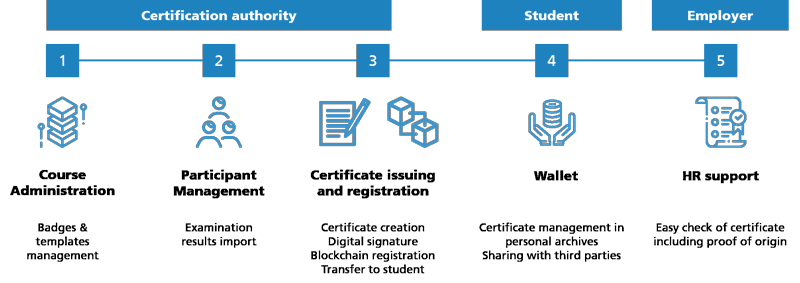by Wolfgang Prinz, Sabine Kolvenbach and Rudolf Ruland (Fraunhofer FIT)
Certificates are important to document educational attainments, and educational documentation is required when it comes to job-seeking and career advancement. It is therefore vital that these records are stored in long-term available and tamper-proof ledgers. The Blockchain for Education platform is a secure and intuitive solution for issuing, sharing, and validating of certificates.
Universities and other educational institutions confirm degrees and achievements of certain learning outcomes by issuing certificates, which, to date, have largely been issued on paper or other physical formats. Certificates include several statements, the most important being: the qualification or academic title attained, the name and address of the issuer organisation, the name and signature of the certifier who has validated the facts and is certifying that the qualification is true, the name of the learner and the date of the examination. Some certificates include additional statements, such as the period of validity.
Students usually receive the certificate as a paper document or PDF. This kind of document has the disadvantage of being difficult to verify, and issuing institutions need to maintain a registry or database for certificates for a long period of time [1]. Employers can only check a certificate’s authenticity by requesting confirmation from the issuing organisation, which is time-consuming and expensive, and thus often avoided. Consequently, a billion-dollar industry in fraudulent degrees has developed [2], with fake educational certificates being available for purchase online. Certification authorities, universities, and educational institutions have expressed a need for a secure and intuitive solution. Digital standardised documents and blockchain technology seem ideal to solve many of the above-mentioned problems.
Solution
Blockchain for Education is a web-based platform that supports counterfeit protection as well as secure management and easy verification of certificates according to the needs of educational institutions, learners, and employers. It ensures greater efficiency and improved security for certification authorities through digitisation of current processes, issuing and registering of certificates in a blockchain as well as automatic monitoring of certificates. To follow the Industrie 4.0 approach [L1] the platform supports machine-readable certificates using an extension of Open Badges [L2].
Our solution supports the whole process from the administration of certificate templates and examination data to the registration of signed certificates in the blockchain to the final check of the validity of the certificate by an HR department, as illustrated in Figure 1. It should be noted that the information registered in the blockchain does not include the learner’s personal data, i.e. the protection of privacy for learners is ensured. Furthermore, the platform enables certification authorities to revoke certificates. This could be necessary when plagiarism has been detected, misconduct of the certified learner was proven, or learners have not provided evidence of required refreshment trainings.

Figure 1: Certification process supported by Blockchain for Education.
Learners can securely manage their certificates and degrees in their wallet via an intuitive App running on smartphones, tablets, and PCs. The wallet visualises the imported certificates, monitors certificates with a time-limited validity and indicates expirations, and provides an easy means to share certificates with potential employers. Learners can also print the certificate. The QR-code on the document contains the verification URL.
Trustworthy verification of certificates is guaranteed for employers by an easy to use web-based proof service. When employers receive the certificate, they can upload it by drag and drop on the proof service or scan the QR-code with a smartphone. The verification service verifies the given data in the blockchain, performs the proof of origin, and presents the check result. In addition to verifying individual certificates, human resources departments can gain verification overviews of employees’ certificates. For example in the financial sector this simplifies and accelerates proceedings towards the regulatory authority.
The Blockchain for Education platform is based on the Quorum Blockchain with consensus algorithm Istanbul BFT, including two smart contracts, the InterPlanetary File System (IPFS), a document management system, and the wallet. The first smart contract registers the identities of certification authorities and certifiers, the second smart contract registers the fingerprints of the certificates. The IPFS holds profile information of certification authorities. The document management system for issuing institutions manages the actual payload of certificates and the parties involved in the process, namely accreditation and certification authorities, certifiers, learners, and human resources departments. The API enables the integration with existing infrastructures such as the learning management system Moodle.
Product launch
The Blockchain for Education platform was developed in an iterative and incremental process in strong collaboration with certification authorities and universities [3]. A first platform prototype was successfully demonstrated on CEBIT 2018. We are continuously extending and enhancing the system. In December 2019 we will launch the product; our first customer is the Fraunhofer Personnel Certification Authority [L3]. In parallel we initiated DigiCerts [L4], a network of universities and educational institutions that aims to collaboratively develop standards and solutions in certification processes. The network is an open network and we invite other members from the ERCIM community to join it.
Links:
[L1] https://kwz.me/hKd
[L2] https://openbadges.org/
[L3] https://kwz.me/hKc
[L4] https://www.digicerts.eu/
References:
[1] A. Grech, A. F. Camilleri: “Blockchain in Education”, No. JRC108255, Joint Research Centre (Seville site), 2017.
[2] A. Ezell, J. Bear: “Degree mills: The billion-dollar industry that has sold over a million fake diplomas”, Pyr Books, 2005.
[3] W. Gräther, et al.: “Blockchain for Education: Lifelong Learning Passport”, ERCIM Blockchain Workshop 2018: Blockchain Engineering: Challenges and Opportunities for Computer Science Research, Amsterdam 2018. doi:10.18420/blockchain2018_07.
Please contact:
Sabine Kolvenbach,
Fraunhofer FIT, Germany











